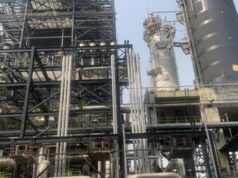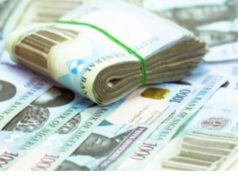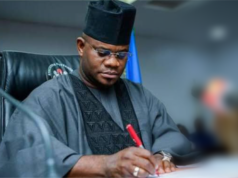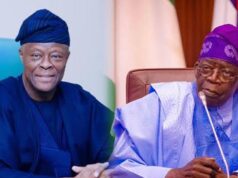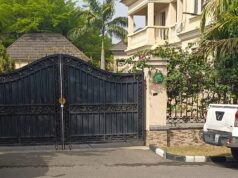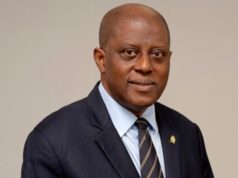
Nigeria’s total public debt as of September, third quarter of 2021, is N38.005 trillion, the Debt Management Office (DMO), has said.
This was disclosed in a media statement titled, ‘DMO publishes total public debt for Q3, 2021’ on the DMO’s website, yesterday.
It read: “In line with its practice, the Debt Management Office has published Nigeria’s Total Public Debt as at September 30, 2021. The data, which includes the Total External and Domestic Debts of the Federal Government of Nigeria, 36 state governments and the Federal Capital Territory, shows that Nigeria’s public debt was N38.005 trillion or $92.626 billion at the end of Q3,2021.”
The total debt stock rose by N2.540 trillion in three months from June 30, end of second quarter, to September 30, 2021.
The statement read in part: “The increase of N2.540 trillion when compared to the corresponding figure of N35.465 trillion at the end of Q2 2021 was largely accounted for by the $4 billion Eurobonds issued by the government in September 2021.”
It added: “The issuance of the $4 billion Eurobonds has brought significant benefits to the economy by increasing the level of Nigeria’s external reserves, thereby supporting the naira exchange rate and providing the necessary capital to enable the Federal Government finance various projects in the budget.”
The office further clarified that the triple tranche $4 billion Eurobond, issued in September 2021, was for the implementation of the new external borrowing of $6.18 billion in the 2021 Appropriation Act.
MEANWHILE, the House of Representatives has approved President Muhammadu Buhari’s loan request of $5.8 billion and grant of $10 million. The loans are to be sourced from the World Bank, Islamic Development Bank, China Exim Bank, Chinese Africa Development Fund, and International Fund for Agricultural Development (IFAD).
In approving the loan, the House asked that the terms and conditions of the loan from the funding agencies be forwarded to the National Assembly for proper execution and commendation.
The House Committee on Aids, Loans and Debt Management, had presented its report through the Chairman, Ahmed Safana (APC-Katsina).
Safana observed that the total borrowing of $5.8 billion covers $2.3 billion for the Grid Modernisation and Expansion Programme, $290 million for the malaria project, $700 million for the Sustainable Water Supply, Sanitation and Hygiene (WASH) Project, $786,382,967 for the Gurara Phase II project, among several others.
Safana said: “That the House do approve the under listed ongoing negotiation of external borrowing of $5,803,364,553.50 and a grant component of $10 million under the 2018-2020 External Borrowing (Rolling) plan.”
SIMILARLY, the Board of Directors of the African Development Bank (AfDB), yesterday, approved a $210 million loan to Nigeria to fund agro-industrial processing zones in different parts of the country. The loan will co-finance phase one of the Nigeria Special Agro-Industrial Processing Zone Programme, a statement obtained from the bank said.
The programme is expected to unlock Nigeria’s agriculture sector potential and create jobs for the citizens. It is conceived to promote industrialisation through the development of strategic crops and livestock.
According to the statement, the financing represents one of the bank’s most ambitious operations in terms of scale and scope to date. The facility is made up of an AfDB loan of $160 million and an Africa Growing Together Fund loan of $50 million.
The first phase of the project targets seven states and the FCT. The states and focal areas are Cross River (cocoa, rice and cassava); Imo (beef and dairy livestock); Kaduna (tomato, maize and ginger); and Kano (rice, tomato, groundnuts and sesame oil).
Others are Kwara (livestock); Ogun (cassava, rice, poultry and fisheries); Oyo (cassava, soybean and rice) and FCT (beef and dairy livestock).
According to AfDB, the project will support Nigeria’s efforts to raise agricultural output, promote investment, create wealth and transform rural areas into economic hubs. It noted that the phase would be implemented with co-financing totaling $538.05 million from other partners.
AfDB Group President, Dr. Akinwumi Adesina, said: “This first phase of the programme is not government-driven. It is government-enabled and private sector-led. That is the critical way in which you have the structural transformation of agriculture.
“It is impressive to see a strong commitment from the Nigerian government – a very strong commitment from the Nigerian Minister of Finance and all of the state governments because they have to give the land, they make sure that all the regulations and incentives are provided.”
The Director-General of the bank’s Nigeria Country Office, Lamin Barrow, said: “Phase 1 of the Nigeria Special Agro-Industrial Processing Zones Programme will mobilise private sector investment in the agro-industrial hubs and agricultural transformation centres. It will impact some 1.5 million households as direct beneficiaries, with a target of creating 400,000 direct jobs and up to 1.6 million indirect jobs.”
The Islamic Development Bank and the International Fund for Agricultural Development will provide parallel co-financing for the projects while federal and state governments will contribute in cash and kind.
HOWEVER, the DMO has stated the need for Federal Government to adopt a significant revenue drive to reduce the nation’s rising debt and minimise fresh borrowing.
At the 2021 virtual Coronation Merchant Bank’s virtual webinar on ‘Nigeria’s Debt Landscape: Opportunities for Investors’, held yesterday, the Director-General of the DMO, Patience Oniha, insisted that government needs to prioritise and invest heavily on sectors capable of generating increased revenue such as agriculture, mining and ICT to grow the economy.
According to her, sectors with robust revenue drivers are better positioned to respond to the risks associated with any transformation and to the urgency created by disruptive events.
She stated that Nigeria’s debt profile has been on the increase because of the impact of revenue crash and the crises trailing the Coronavirus pandemic on the economy.
She argued that the rate of borrowing had started declining until COVID-19 crisis forced Nigeria, like many other nations, to increase its borrowing to stimulate the economy and create more jobs for the people.
“If we grow revenue, debt service to revenue will be low and when this happens, we need not to borrow more. Government can now finance various projects it needs to.”
The DMO boss also advocated that government’s increased collaboration with the private sector is needed to help finance capital projects, boost balance sheet and minimise debt financing.
Oniha admitted that the nation’s growing insecurity poses a threat to investment inflow but stated that this had remained a priority to attract long-term capital needed to support government initiative.
Also speaking, the Chief Executive Officer of FMDQ Securities Exchange, Bola Onadele, said government needs to deploy large proportion of its borrowing into the productive sector to stimulate growth.
He said: “Debt is sustainable when a country has the ability and size to meet current and future payment obligation without external assistance and default. Debt that is not sustainable has a negative consequence on investment.
“It is important that any country trying to borrow should have a pay back structure because investors in the global market look at capabilities to pay back to see if the country is within the purview of debt to revenue ratio.”
SENATOR Shehu Sani, who represented Kaduna Central constituency at the eighth National Assembly, has described the current Senators as sleeping Senators who specialise in approving loans for Mr President without serious scrutiny.
Speaking yesterday at Delta State civil society event in Asaba, Sani said: “During our stay in the National Assembly, request for loans were thoroughly scrutinised and debated seriously.”
According to him, “the committee where I have the likes of Dino Melaye and Ben Bruce, we threw away loans that did not represent the generality of Nigerians.
“But now, within two years, the National Assembly has approved over $30 billion loans without serious debate. Currently, before Mr President sends request for loan, it has already been approved without scrutiny.
“I am saying this because many have been in the House for years without impact, without meaningful contribution, but people like us spent four years and made impact. We did not go there to learn, we were already professionals and we did the needful.”
To get it right, he urged the civil society organisations to prevail on the President to sign the Electoral Bill recently passed by National Assembly.






































